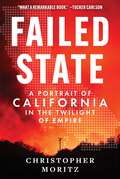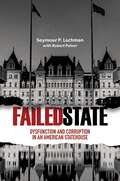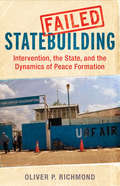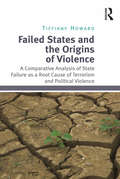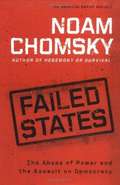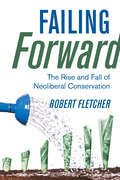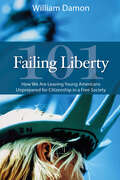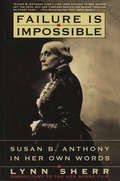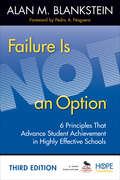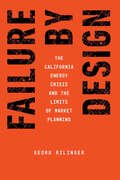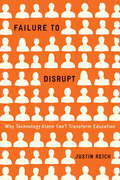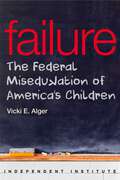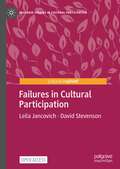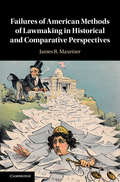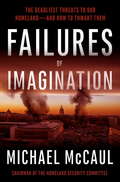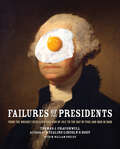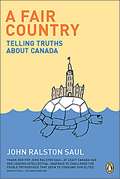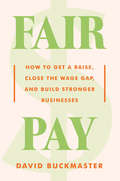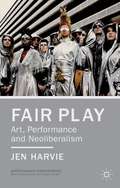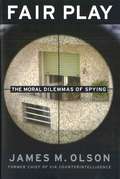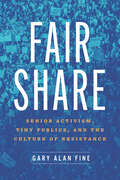- Table View
- List View
Failed Peacemaking: Counter-Peace and International Order (Rethinking Peace and Conflict Studies)
by Oliver P. Richmond Gëzim Visoka Sandra PogoddaThis book investigates why peace and reform processes across the world have recently been stagnating or have become blocked. They have failed to maintain security, rights, development, and justice in the liberal international order. The book identifies the related rise of counter-peace processes at the heart of failed peacemaking efforts, and explores the implications for an emerging multi-polar order where local and international tools for peace and reform appear to be ineffective. Across a range of recent cases, from Cambodia, the Balkans, the Sahel region, DRC, Colombia, Afghanistan, and many others, such dynamics are becoming clearer. In particular, small-scale blocking tactics across different peace processes have been evolving into larger political strategies which are then disseminated within revisionist and revanchist international networks. Ultimately, this phenomenon has undermined liberal international order.Spoilers and tactical blockages to peace have connected across local, national, regional and international scales, highlighting ideological divisions. Drawing on counter-revolutionary theory, the concept of counter-peace is used as a tool to critically interrogate a systemic array of blockages to peace. Distinct counter-peace patterns are now entangled in peace and reform processes, including the stalemate pattern, the limited counter-peace, and the unmitigated counter-peace patterns. Across cases, once tactical blockages begin to form these patterns, they become systemic and ultimately enable conflict escalation. Consequently, the intimate entanglement of the existing international peace architecture with counter-peace processes points to ideological divisions in international order, as well as the growing gulf between diminished practices of peace and reform with critical scholarship on peace, justice, and sustainability.
Failed State: A Portrait of California in the Twilight of Empire
by Christopher MoritzCalifornia was once the crown jewel of the American dream: prosperous, innovative, egalitarian, and aspirational. Today, it stands as a dystopian warning of what happens when nihilistic, radical ideology consumes the foundations of governance. In Failed State, Christopher Moritz dissects the unraveling of the Golden State with the precision of a lawyer, the depth of a historian, and the heartbreak of a California native son who has witnessed its collapse firsthand. Through disturbing, relentless detail drawn from whistleblowers, law enforcement insiders, and classified reports, he exposes the corrosive and deadly impact of progressive policies that have prioritized criminals over victims, cartels over citizens, and ideological dogma over law and order. Moritz reveals the architects of this catastrophe: rogue prosecutors bankrolled by anarchist billionaires, open-border zealots who have transformed California into a cartel haven, and policymakers who have gutted public safety in the name of equity. The 2025 Palisades Fire, a man-made disaster, epitomize this descent into chaos. Fire hydrants ran dry while organized looters turned evacuation zones into war zones. Resources were squandered on symbolic virtue-signaling as ordinary citizens were left defenseless in the face of destruction. These failures are not isolated—they are the inevitable result of policies designed to dismantle civic order and empower anarchic forces at the expense of law-abiding Americans. Yet, Failed State is more than an autopsy of California&’s collapse. Drawing on historical parallels—from the Bolshevik Revolution&’s destruction of Christian Russia to the ethnic cleansing of Rhodesia by Mugabe&’s communists—Moritz warns that California&’s crisis is not contained to the Golden State. It is a harbinger for America&’s future if these radical trends metastasize nationwide. His searing analysis reveals the systematic dismantling of civil society and the betrayal of a state&’s duty to its citizens, all in service of an anti-civilization agenda cloaked in the language of progress. Unflinching, provocative, and unapologetically honest, Failed State is a rallying cry for those who refuse to stand by as America&’s most prosperous state spirals into lawlessness and disorder. For those seeking clarity amid chaos, Christopher Moritz delivers a blistering indictment of failed leadership and a warning that the unraveling of California could signal that unraveling of the nation itself.
Failed State: Dysfunction and Corruption in an American Statehouse (Excelsior Editions)
by Seymour P. LachmanFailed State is both an original account of a state legislature in urgent need of reform and a call to action for those who would fix it. Drawing on his experiences both in and out of state government, former New York State senator Seymour P. Lachman reveals and explores Albany's hush-hush, top-down processes, illuminating the hidden, secretive corners where the state assembly and state senate conduct the people's business and spend public money. Part memoir and part exposé, Failed State is a revision of and follow-up to Three Men in a Room, published in 2006. The focus of the original book was the injury to democratic governance that arises when three individuals—governor, senate majority leader, and assembly speaker—tightly control one of the country's largest and most powerful state governments. Expanding on events that have occurred in the decade since the original book's publication, Failed State shows how this scenario has given way to widespread corruption, among them the convictions of two men in the room—the senate and assembly leaders—as well as a number of other state lawmakers. All chapters have been revised and expanded, new chapters have been added, and the final chapter charts a path to durable reform that would change New York's state government from its present-day status as a national disgrace to a model of transparent, more effective state politics and governance.
Failed Statebuilding
by Oliver RichmondWestern struggles—and failures—to create functioning states in countries such as Iraq or Afghanistan have inspired questions about whether statebuilding projects are at all viable, or whether they make the lives of their intended beneficiaries better or worse. In this groundbreaking book, Oliver Richmond asks why statebuilding has been so hard to achieve, and argues that a large part of the problem has been Westerners’ failure to understand or engage with what local peoples actually want and need. He interrogates the liberal peacebuilding industry, asking what it assumes, what it is getting wrong, and how it could be more effective.
Failed States and the Origins of Violence: A Comparative Analysis of State Failure as a Root Cause of Terrorism and Political Violence
by Tiffiany HowardWhat makes a terrorist? Is an individual inherently predisposed to be attracted to political violence or does exposure to a certain environment desensitize them in such a way that violence represents a viable mode for addressing political grievances? Identifying state failure as the impetus for political violence this book addresses these questions and focuses on why existing extremist groups find failed states so attractive. Utilizing global barometer data, Tiffiany Howard examines the underpinnings of individual support for political violence and argues that an insidious pattern of deprivation within failed states drives ordinary citizens to engage in and support extreme acts of political violence. A rigorous examination of four regions plagued by a combination of failed states and political violence-Sub Saharan Africa, The Middle East and North Africa, Southeast and South Asia, and Latin America-this text draws parallels to arrive at a single conclusion: that failed states are a natural breeding ground for terrorism and political violence.
Failed States: The Abuse of Power and the Assault on Democracy
by Noam ChomskyTHE WORLD'S FOREMOST CRITIC OF U.S. FOREIGN POLICY EXPOSES THE HOLLOW PROMISES OF DEMOCRACY IN U-S. ACTIONS ABRoAD -AND AT HOME THE UNITED STATES HAS REPEATEDLY asserted its right to intervene militarily against "failed states" around the globe. In this muchanticipated follow-up to his international bestseller Hegemony or Survival, Noam Chomsky turns the tables, showing how the United States itself shares features with other failed states and therefore is increasingly a danger to its own people and the world. Failed states, Chomsky writes, are those that are unable or unwilling "to protect their citizens from violence and perhaps even destruction" and "regard themselves as beyond the reach of domestic or international law." Though they may have democratic forms, Chomsky notes, failed states suffer from a serious "democratic deficit" that deprives their democratic institutions of real substance. Exploring the latest developments in U.S. foreign and domestic policy, Chomsky reveals Washington's plans to further militarize the planet greatly increasing the risks of nuclear war; assesses the dangerous consequences of the occupation of Iraq, which has fueled global outrage at the United States; documents Washington's self-exemption from international norms, including the UN Charter and the Geneva Conventions, the foundations of contemporary international law, and the Kyoto Protocol; and examines how the U.S. electoral system is designed to eliminate genuine political alternatives, impeding any meaningful democracy.
Failing Forward: The Rise and Fall of Neoliberal Conservation
by Robert FletcherFailing Forward documents the global rise of neoliberal conservation as a response to biodiversity loss and unpacks how this approach has managed to "fail forward" over time despite its ineffectiveness. At its core, neoliberal conservation promotes market-based instruments intended to reconcile environmental preservation and economic development by harnessing preservation itself as the source of both conservation finance and capital accumulation more generally. Robert Fletcher describes how this project has developed over the past several decades along with the expanding network of organizations and actors that have come together around its promotion. Drawing on Lacanian psychoanalysis, he explores why this strategy continues to captivate states, nongovernmental organizations, international financial institutions, and the private sector alike despite its significant deficiencies. Ultimately, Fletcher contends, neoliberal conservation should be understood as a failed attempt to render global capitalism sustainable in the face of its intensifying social and ecological contradictions. Consequently, the only viable alternative capable of simultaneously achieving both environmental sustainability and social equity is a concerted program of "degrowth" grounded in post-capitalist principles.
Failing Liberty 101: How We Are Leaving Young Americans Unprepared for Citizenship in a Free Society
by William DamonThe author argues that we are failing to prepare today's young people to be responsible American citizens—to the detriment of their life prospects and those of liberty in the United States of the future. He identifies the problems—the declines in civic purpose and patriotism, crises of faith, cynicism, self-absorption, ignorance, indifference to the common good—and shows that our disregard of civic and moral virtue as an educational priority is having a tangible effect on the attitudes, understanding, and behavior of large portions of the youth in our country today.
Failure Is Impossible: Susan B. Anthony in Her Own Words
by Lynn SherrJuxtaposed with contemporary reports and biographical essays, the words of this legendary suffragist reveal Susan B. Anthony as a loyal, caring friend, and an eloquent, humorous crusader. "More than a collection of well-arranged quotations, the work informs, inspires, and gives historical perspective."--The Houston Post. 33 photos & illustrations.From the Trade Paperback edition.
Failure Is Not an Option: 6 Principles That Advance Student Achievement in Highly Effective Schools
by Alan M. BlanksteinSchool improvement that lasts: find out how with this masterful guide! New case studies and field-tested tools and techniques uncover indispensible insights in the powerful third edition of this bestseller. Discover why more than 350,000 educators have used this book to create schools that sustain success for every student. Build high-performing leadership teams across schools and districts through: Engagement strategies and capacity-building questions to help staff and students target meaningful goals New real-world examples to help stakeholders maintain collaborative cultures in the face of new teacher evaluations and merit pay, RTI and Common Core mandates, and diverse settings New tools, forms, and video segments on a companion website
Failure and Hope
by Christine MahoneyIn 2015, 60 million people were displaced by violent conflict globally - the highest since World War II. National and international policy prevents the displaced from working or moving freely outside the camps set up to 'temporarily' house them. This policy has left the displaced with no right to work and move while they remain displaced for years, if not decades. Based on data on all 61 protracted displacement crises worldwide, fieldwork in seven conflict zones around the world, and in-depth interviews with over 170 humanitarian aid workers, government officials and refugees, the book systematically details the barriers to effective advocacy at every level of governance and shows that failure is the norm. Unlike many academic monographs, it goes further and proposes an alternative way forward that capitalizes on social entrepreneurship, crowd-funding and micro-finance to improve the lives of those that have been forced to flee their homes to find safety.
Failure by Design: The California Energy Crisis and the Limits of Market Planning
by Georg RilingerA new framework for studying markets as the product of organizational planning and understanding the practical limits of market design. The Western energy crisis was one of the great financial disasters of the past century. The crisis began in April 2000, when price spikes started to rattle California’s electricity markets. Decades later, some blame economic fundamentals and ignorant politicians, while others accuse the energy sellers who raided the markets. In Failure by Design, sociologist Georg Rilinger offers a different explanation, one that focuses on the practical challenges of market design. The unique physical attributes of electricity made it exceedingly difficult to introduce markets into the coordination of the electricity system, so market designers were brought in to construct the infrastructures that coordinate how market participants interact. An exercise in social engineering, these infrastructures were intended to guide market actors toward behavior that would produce optimal market results and facilitate grid management. Yet, though these experts spent their days worrying about incentive misalignment and market manipulation, they unintentionally created a system riddled with opportunities for destructive behavior. Rilinger’s analysis not only illuminates the California energy crisis but also develops a broader theoretical framework for thinking about markets as the products of organizational planning and the limits of social engineering, contributing broadly to sociological and economic thinking about the nature of markets.
Failure to Disrupt: Why Technology Alone Can’t Transform Education
by Justin ReichA leader in educational technology separates truth from hype, explaining what tech can—and can’t—do to transform our classrooms.Proponents of large-scale learning have boldly promised that technology can disrupt traditional approaches to schooling, radically accelerating learning and democratizing education. Much-publicized experiments, often underwritten by Silicon Valley entrepreneurs, have been launched at elite universities and in elementary schools in the poorest neighborhoods. Such was the excitement that, in 2012, the New York Times declared the “year of the MOOC.” Less than a decade later, that pronouncement seems premature.In Failure to Disrupt: Why Technology Alone Can’t Transform Education, Justin Reich delivers a sobering report card on the latest supposedly transformative educational technologies. Reich takes readers on a tour of MOOCs, autograders, computerized “intelligent tutors,” and other educational technologies whose problems and paradoxes have bedeviled educators. Learning technologies—even those that are free to access—often provide the greatest benefit to affluent students and do little to combat growing inequality in education. And institutions and investors often favor programs that scale up quickly, but at the expense of true innovation. It turns out that technology cannot by itself disrupt education or provide shortcuts past the hard road of institutional change.Technology does have a crucial role to play in the future of education, Reich concludes. We still need new teaching tools, and classroom experimentation should be encouraged. But successful reform efforts will focus on incremental improvements, not the next killer app.
Failure: The Federal Miseducation of America's Children
by Vicki E. AlgerA comprehensive account and frank assessment of federal involvement in education is long overdue. Education policy expert Vicki E. Alger remedies this deficiency with her book, Failure: The Federal Miseducation of America&’s Children.As its title indicates, Failure makes no effort to sugar coat its findings: Created in 1979, after a lobbying campaign that spanned generations, the Department of Education has failed to live up to its promises. Federal involvement—whether related to testing, funding, or academic curricula—has failed to abide by the Constitution&’s implication that education must remain the domain only of state and local governments and private institutions. Most of all, the central government&’s pervasive meddling in education has failed America&’s school children and their parents. Education policy has long been mired in controversies, often with opposing sides missing the mark. Failure helps us step back from the skirmish du jour and redirects our focus to the big picture, showing us what&’s gone wrong over the decades and the institutional causes of these failures. It also offers a bold blueprint for returning the federal government to its constitutional role and for cultivating an educational system that meets the needs of students and parents, rather than bureaucrats. Concerned citizens of every stripe will benefit from Failure&’s history of federal education policy, its brutally honest report card for the Department of Education, its look at education systems across the globe, and its ambitious policy recommendations. Failure might even succeed in reframing the way the federal education establishment thinks about education policy.
Failures in Cultural Participation (Palgrave Studies in Cultural Participation)
by David Stevenson Leila JancovichThis open access book examines how and why the UK's approach towards increasing cultural participation has largely failed to address inequality and inequity in the subsidised cultural sector despite long-standing international policy discourse on this issue. It further examines why meaningful change in cultural policy has not been more forthcoming in the face of this apparent failure. This work examines how a culture of mistrust, blame, and fear between policymakers, practitioners, and participants has resulted in a policy environment that engenders overstated aims, accepts mediocre quality evaluations, encourages narratives of success, and lacks meaningful critical reflection. It shows through extensive field work with cultural professionals and participants how the absence of criticality, transparency, and honesty limits the potential for policy learning, which the authors argue is a precondition to any radical policy change and is necessary for developing a greater understanding of the social construction of policy problems. The book presents a new framework that encourages more open and honest conversations about failure in the cultural sector to support learning strategies that can help avoid these failures in the future.
Failures of American Methods of Lawmaking in Historical and Comparative Perspectives
by Philip K. Howard James R. MaxeinerIn this book, James R. Maxeiner takes on the challenge of demonstrating that historically American law makers did consider a statutory methodology as part of formulating laws. In the nineteenth century, when the people wanted laws they could understand, lawyers inflicted judge-made, statute-destroying, common law on them. Maxeiner offers the cure for common law, in the form of sensible statute law. Building on this historical evidence, Maxeiner shows how rule-making in civil law jurisdictions in other countries makes for a far more equitable legal system. Sensible statute laws fit together: one statute governs, as opposed to several laws that even lawyers have trouble disentangling. In a statute law system, lawmakers make laws for the common good in sensible procedures, and judges apply sensible laws and do not make them. This book shows how such a system works in Germany and would be a solution for the American legal system as well.
Failures of Imagination
by Michael MccaulFrom the Chairman of the U.S. House of Representatives Homeland Security Committee, a gripping look at the most dangerous and unexpected threats to our national security--and the actions needed to protect us. America's inability to foresee the September 11, 2001 attacks was deemed a collective "failure of imagination." Our political leaders and intelligence professionals failed to anticipate the wide-ranging and unorthodox threats to the nation's security. Nearly a decade and a half later, imaginations in Washington D.C. are still failing. Despite assurances from our leaders that America is safer today than it was before 9/11, the truth is, we are still vulnerable.Congressman Michael McCaul has spent years in Washington watching the Obama administration ignore or dangerously underestimate the most pressing threats to the country. Now in Failures of Imagination: The Deadliest Threats to Our Homeland--and How to Thwart Them, the sitting chairman of the Homeland Security Committee, who receives daily intelligence about threats materializing against America, depicts in real time the hazards that are closer than we realize. From cyber-warriors who can cripple the Eastern seaboard to radicalized Americans in league with Islamic jihadists to invisible biological warfare, many of the most pressing dangers are the ones we've heard about the least--and are doing the least about. In this compelling and action-packed narrative, McCaul outlines realistic scenarios that could inflict more damage on the nation than any attack we've yet faced. He then explains how our vulnerabilities were created, why our enemies are actively contemplating them, and what we can do to solve them before it's too late. Failures of Imagination offers a call to action for Americans to address these very real and present dangers, and the need for the White House--whoever its occupant will be--to combat them with the seriousness and urgency they require.From the Hardcover edition.
Failures of the Presidents: From the Whiskey Rebellion and War of 1812 to the Bay of Pigs and War in Iraq
by M. William Phelps Thomas J. CraughwellTake a humbling journey through America’s proud history with this engaging and informative look at the nation’s most epic presidential blunders.Failures of the Presidents recounts twenty of the worst bad calls to come out of the executive office, ranging from the nation’s birth to the start of the twenty-first century. Author Thomas Craughwell begins with George Washington, who tried to pay for the Revolutionary War with a tax on whiskey—a choice that sparked the newly formed country’s first bloody rebellion.Centuries later, another George—the second President Bush—was convinced that Iraq was hiding weapons of mass destruction. His invasion of the country resulted in a protracted, deadly, and costly war that gave a serious blow to American credibility around the world.Between these episodes, there were many other regrettable, embarrassing, or downright disastrous mistakes made by residents of the White House—the worst of which are explored in this book.
Fair Country,A
by John Ralston SaulIn this startlingly original vision of Canada, renowned thinker John Ralston Saul argues that Canada is a Métis nation, heavily influenced and shaped by Aboriginal ideas: Egalitarianism, a proper balance between individual and group, and a penchant for negotiation over violence are all Aboriginal values that Canada absorbed. An obstacle to our progress, Saul argues, is that Canada has an increasingly ineffective elite, a colonial non-intellectual business elite that doesn't believe in Canada. It is critical that we recognize these aspects of the country in order to rethink it's future.
Fair Food
by Oran B. HestermanA host of books and films in recent years have documented the dangers of our current food system, from chemical runoff to soaring rates of diet-related illness to inhumane treatment of workers and animals. But advice on what to do about it largely begins and ends with the admonition to "eat local or "eat organic." Fair Food is an enlightening and inspiring guide to changing not only what we eat, but how food is grown, packaged, delivered, marketed, and sold. Oran B. Hesterman shows how our system's dysfunctions are unintended consequences of our emphasis on efficiency, centralization, higher yields, profit, and convenience--and defines the new principles, as well as the concrete steps, necessary to restructuring it. Along the way, he introduces people and organizations across the country who are already doing this work in a number of creative ways, from bringing fresh food to inner cities to fighting for farm workers' rights to putting cows back on the pastures where they belong. He provides a wealth of practical information for readers who want to get more involved.
Fair Pay: How to Get a Raise, Close the Wage Gap, and Build Stronger Businesses
by David BuckmasterLonglisted for the 2021 Porchlight Business Book Awards, Management & Workplace CultureAn expert takes on the crisis of income inequality, addressing the problems with our current compensation model, demystifying pay practices, and providing practical information employees can use when negotiating their salaries and discussing how we can close the gender and racial pay gap.American workers are suffering economically and fewer are earning a living wage. The situation is only worsening. We do not have a common language to talk about pay, how it works at most companies, or a cohesive set of practical solutions for making pay more fair. Most blame the greed of America’s executive class, the ineptitude of government, or a general lack of personal motivation. But the negative effects of income inequality are a problem that can be solved. We don’t have to choose between effective government policy and the free market, between the working class and the job creators, or between socialism and capitalism, David Buckmaster, the Director of Global Compensation for Nike, argues. We do not have to give up on fixing what people are paid. Ideas like Universal Basic Income will not be enough to avoid the severe cultural disruption coming our way.Buckmaster examines income inequality through the design and distribution of income itself. He explains why businesses are producing no meaningful wage growth, regardless of the unemployment rate and despite sitting on record piles of cash and the lowest tax rates[0] in a generation . He pulls back the curtain on how corporations make decisions about wages and provides practical solutions—as well as the corporate language—workers need to get the best results when talking about money with a boss. The way pay works now will not overcome our most persistent pay challenges, including low and stagnant wages, unequal pay by race and gender, and executive pay levels untethered from the realities of the average worker. The compensation system is working as designed, but that system is broken. Fair Pay opens the corporate black box of pay decisions to show why businesses pay what they pay and how to make them pay more.
Fair Play – Art, Performance and Neoliberalism
by Jen HarvieThis book asks what is the quality of participation in contemporary art and performance? Has it been damaged by cultural policies which have 'entrepreneurialized' artists, cut arts funding and cultivated corporate philanthropy? Has it been fortified by crowdfunding, pop-ups and craftsmanship? And how can it help us to understand social welfare?
Fair Play: The Moral Dilemmas Of Spying
by James M. OlsonRevolutionary War officer Nathan Hale, one of America’s first spies, said, “Any kind of service necessary to the public good becomes honorable by being necessary.” A statue of Hale stands outside CIA headquarters, and the agency often cites his statement as one of its guiding principles. But who decides what is necessary for the public good, and is it really true that any kind of service is permissible for the public good? <p><p> These questions are at the heart of James M. Olson’s book, Fair Play: The Moral Dilemmas of Spying. Olson, a veteran of the CIA’s clandestine service, takes readers inside the real world of intelligence to describe the difficult dilemmas that field officers face on an almost daily basis. Far from being a dry theoretical treatise, this fascinating book uses actual intelligence operations to illustrate how murky their moral choices can be. Readers will be surprised to learn that the CIA provides very little guidance on what is, or is not, permissible. Rather than empowering field officers, the author has found that this lack of guidelines actually hampers operations. Olson believes that U.S. intelligence officers need clearer moral guidelines to make correct, quick decisions. Significantly, he believes these guidelines should come from the American public, not from closed-door meetings inside the intelligence community. Fair Play will encourage a broad public debate about the proper moral limits on U.S. intelligence activities.
Fair Share: Senior Activism, Tiny Publics, and the Culture of Resistance
by Gary Alan FineA deeply researched ethnographic portrait of progressive senior activists in Chicago who demonstrate how a tiny public wields collective power to advocate for broad social change. If you've ever been to a protest or been involved in a movement for social change, you have likely experienced a local culture, one with slogans, jargon, and shared commitments. Though one might think of a cohort of youthful organizers when imagining protest culture, this powerful ethnography from esteemed sociologist Gary Alan Fine explores the world of senior citizens on the front lines of progressive protests. While seniors are a notoriously important—and historically conservative—political cohort, the group Fine calls “Chicago Seniors Together” is a decidedly leftist organization, inspired by the model of Saul Alinsky. The group advocates for social issues, such as affordable housing and healthcare, that affect all sectors of society but take on a particular urgency in the lives of seniors. Seniors connect and mobilize around their distinct experiences but do so in service of concerns that extend beyond themselves. Not only do these seniors experience social issues as seniors—but they use their age as a dramatic visual in advocating for political change. In Fair Share, Fine brings readers into the vital world of an overlooked political group, describing how a “tiny public” mobilizes its demands for broad social change. In investigating this process, he shows that senior citizen activists are particularly savvy about using age to their advantage in social movements. After all, what could be more attention-grabbing than a group of passionate older people determinedly shuffling through snowy streets with canes, in wheelchairs, and holding walkers to demand healthcare equity, risking their own health in the process?
Fair Share: Senior Activism, Tiny Publics, and the Culture of Resistance
by Gary Alan FineA deeply researched ethnographic portrait of progressive senior activists in Chicago who demonstrate how a tiny public wields collective power to advocate for broad social change. If you've ever been to a protest or been involved in a movement for social change, you have likely experienced a local culture, one with slogans, jargon, and shared commitments. Though one might think of a cohort of youthful organizers when imagining protest culture, this powerful ethnography from esteemed sociologist Gary Alan Fine explores the world of senior citizens on the front lines of progressive protests. While seniors are a notoriously important—and historically conservative—political cohort, the group Fine calls “Chicago Seniors Together” is a decidedly leftist organization, inspired by the model of Saul Alinsky. The group advocates for social issues, such as affordable housing and healthcare, that affect all sectors of society but take on a particular urgency in the lives of seniors. Seniors connect and mobilize around their distinct experiences but do so in service of concerns that extend beyond themselves. Not only do these seniors experience social issues as seniors—but they use their age as a dramatic visual in advocating for political change. In Fair Share, Fine brings readers into the vital world of an overlooked political group, describing how a “tiny public” mobilizes its demands for broad social change. In investigating this process, he shows that senior citizen activists are particularly savvy about using age to their advantage in social movements. After all, what could be more attention-grabbing than a group of passionate older people determinedly shuffling through snowy streets with canes, in wheelchairs, and holding walkers to demand healthcare equity, risking their own health in the process?

